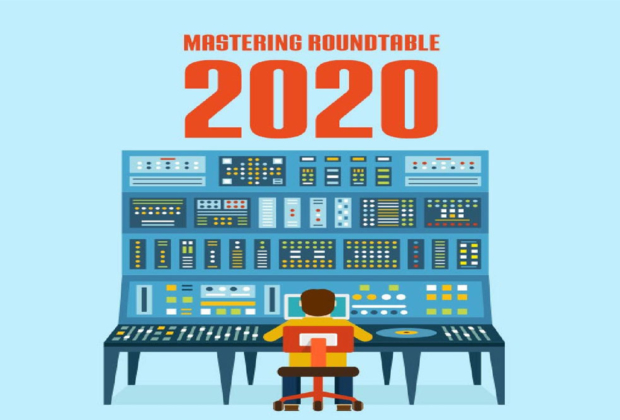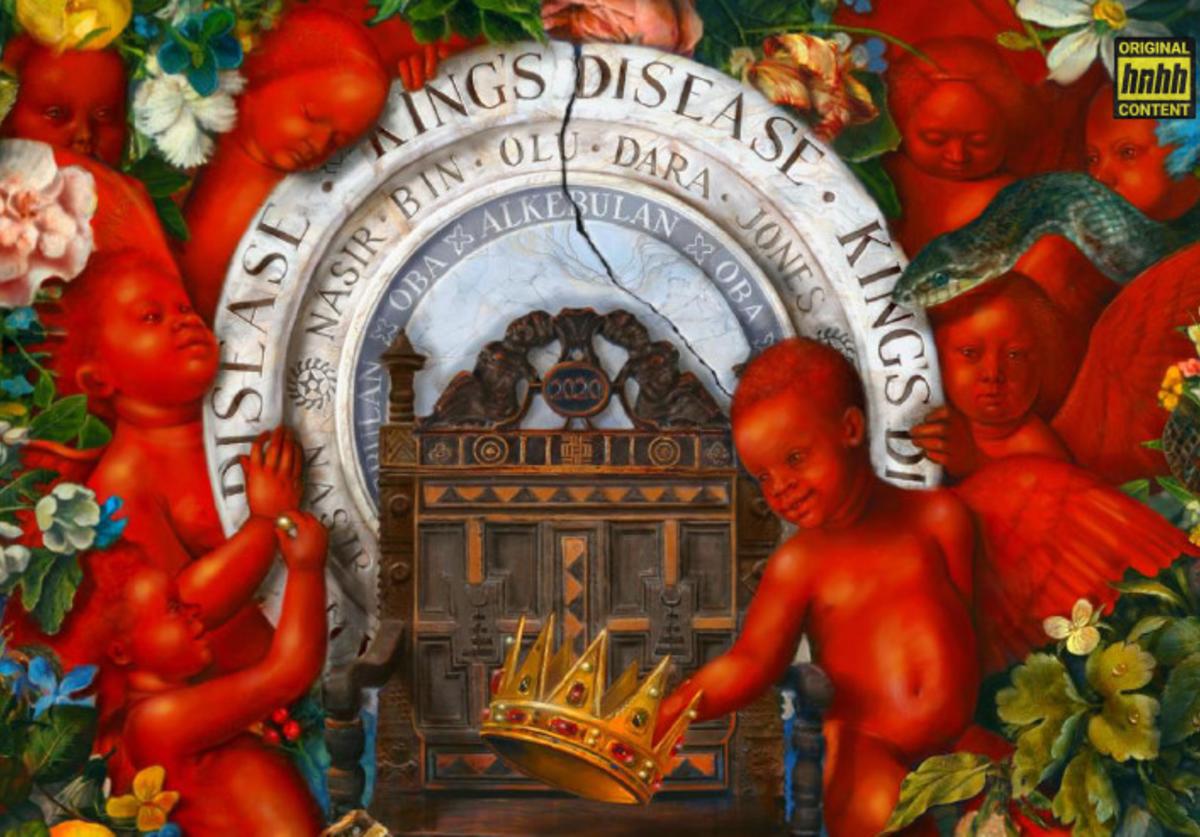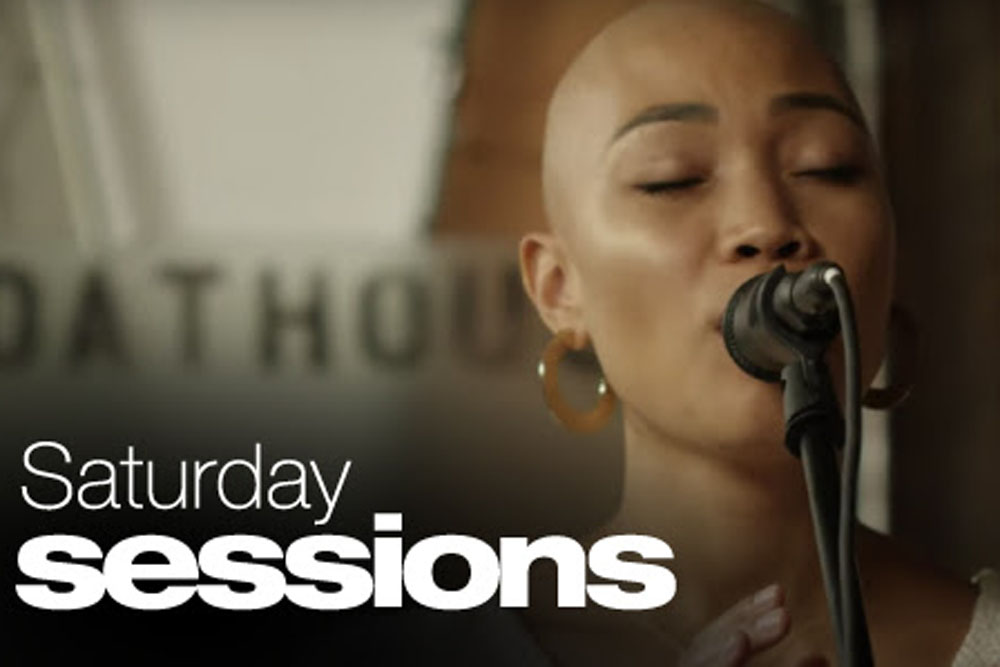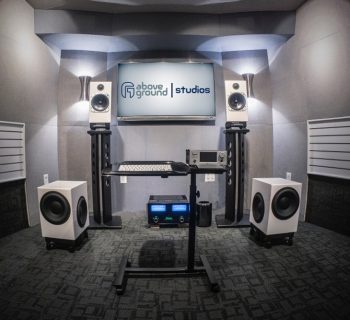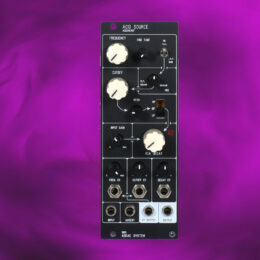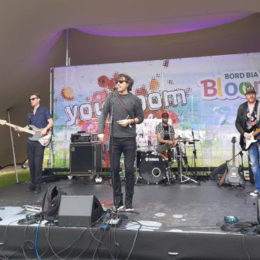Nate Middleman
Company: Above Ground Studios
Clientele: DJ Honda, Tate Kobang, Aniya O’re
Contact: abovegroundstudios.com
Nate Middleman is a 10-year veteran of the Baltimore mastering scene. He began his career as a recording engineer, but when he discovered mastering he knew he’d found his passion. Much of what he’s learned was shown to him by Sterling Sound’s late mastering engineer Tom Coyne. Bob Katz’s book Mastering Audio: The Art and the Science also became his bible and it built on what he’d learned at New York’s Institute of Audio Research. His studio name, Above Ground Studios, is inspired by his process of introducing underground artists into the mainstream––platinum-certified rapper Shordie Shordie, for example.
How has the lockdown affected your business?
My facility has multiple studios and I had to shut down the one where we record. I can still do projects that people send online. I kind of operate the place by myself [now] so it’s a little lonely. But I also produce, so I’ve been able to dive into things.
Are the changes initiated by the lockdown here to stay?
For music production, it will tip the scale even more towards doing it yourself. Recently I sent a recording template to someone I work with. They’re able to do their thing and that will be good for the industry because tracks will still need to be mastered.
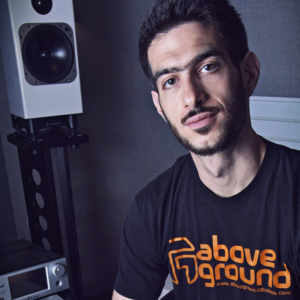
If mix engineers send you stems, what are the common problems with them – for example, misaligned tracks?
Usually I ask for stems when the parts need attention. For example, the vocal might have an opposite problem in the same frequency range as the instrumental. So I use them a lot for repair. If a mix lacks something with it all being one thing, that’s when I need to separate it. The worse it is, the more I need to separate it.
What big changes have been seen in the field in the past year or so?
A lot of times mix engineers try to master for themselves with limited success. People constantly try to release technology to eliminate the mastering engineer. You just have to keep doing what you do and get better.
What are the best ways to find new clients?
SoundBetter, Fiverr, Upwork and other online services. People read your reviews there, so treat every job as important as the next. That leads to word-of-mouth.
What are untapped sources of income for mastering engineers? For example, is there much money to be made with remasters?
Podcasts. I don’t know that they’re getting mastered all of the time. I’d guess that the successful ones are or have some close attention paid to them.
Have online mastering tools improved to the point that they represent a challenge to mastering engineers?
Recently Steve Vai mentioned that he sometimes uses the online mastering tool LANDR. If your mix sounds great, those avenues are a possibility, so in that way it is a threat. Where people will run into problems is that if their mix doesn’t sound great and they use an online mastering service. They’ll wonder why it doesn’t sound incredible.
When you begin to work on a track, is your first instinct about it usually correct?
The key to mastering is that it’s the last 10 percent. If it’s not done right, then everything else was done for nothing. Good mastering could mean doing nothing. The term that I use is ‘relatability, replayability and reliability.’ Is the vibe relatable? Is it something that people want to play over and over again? A song needs to sound the same in every place someone might listen to it.
Do you master for vinyl? If so, what are the unique challenges?
I have and love the way that it sounds. The vinyl place I use––Morphius Records in Baltimore––does a bit of mastering of their own, which
is a skill. I’ve always wanted to sit down and watch what they do.
How do you help clients communicate what they want from you?
Phone conversations are cool but as we work, I like feedback. The message platform on SoundBetter.com, for example, is well organized. It’s easier than a phone call because I don’t have to refresh my memory.
What’s the best path for those that aspire to become mastering engineers? Is a formal education preferred over a practical one?
If you really want to be a mastering engineer, skip school and go to the top-notch mastering houses like Sterling or Bernie Grundman and intern; get coffee. You need a properly tuned room. For me, it was a lot of reading and trial and error.
Has the field of mastering improved in terms of sound in recent years or is there still pressure for music to be loud?
There’s always pressure to make music loud. We’re outside of the loudness wars and are no longer confined by the CD limitations. The revenue-flow has changed because the replayability is where the money is.
What big changes do you foresee for mastering?
Everything will go to phone apps and we’ll all be taken out of position. The business is technology-based. In the meantime, clients come to me because they need better mastering than the automated stuff. We need to get creative and build our skill sets. •
Patricia Sullivan
Company: Bernie Grundman Mastering
Clientele: John Williams, Blake Mills, Mac Miller
Contact: berniegrundmanmastering.com
Patricia Sullivan dove into music when she first heard an Eddie Van Halen guitar solo. Almost immediately, she went out and acquired an ax. In the early ‘90s she enrolled at the Dick Grove School of Music and then landed a runner gig at A&M Studios (now The Jim Henson Company Lot). There, Sullivan began to focus on mastering and––after an informal A-B test of her mastering ears––was taken under the wings of chief engineer Dave Collins and engineer Alan Yoshida. Soon thereafter, she became Collins’ assistant and, in 1999, moved to top-line mastering house Bernie Grundman Mastering.
How has the lockdown affected your business?
Things have slowed down a bit. I do a lot of movie soundtracks, so when all production halted, they didn’t know when they’d release movies so everything kind of stopped. But I’ve had some video games and other things come through so I’ve been able to work.
Are the changes initiated by the lockdown here to stay?
I had around 40 percent of sessions that were attended pre-COVID, so I didn’t have a lot of clients coming in anyway. If they want to err
on the side of caution, it’ll probably be a little longer until people are comfortable being in an enclosed space with a stranger. As far as recording at home, musicians want to play with other people, so that will continue. That’s where the magic happens.
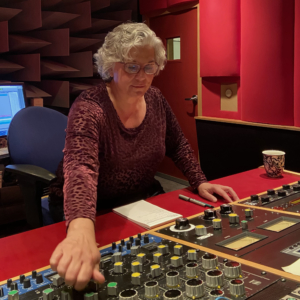
If mix engineers send you stems, what are the common problems with them?
I don’t recommend stems. I prefer a two-track mix, because I’ve found that something like an instrumental and a vocal can work okay. If something is mixed with a compressor or an EQ across the bus, sometimes it doesn’t have that same kind of gel that a stereo mix would have.
What big changes have been seen in the field in the past year or so?
The automated mastering services, even though at the moment they’re just starting to be used by people who can’t afford a real engineer. It’s a cheap way for them to get stuff mastered. There’s also immersive audio, where people are mixing just audio without being married to a movie in Dolby’s Atmos Mastering Suite, so there are some who master for that. That’s a specialization and you have to have a room that’s set up for it.
What are the best ways to find new clients?
I keep tabs on social media, put things out there that I’ve worked on and follow artists I may contact. But word-of-mouth is tried-and-true.
What are untapped sources of income for mastering engineers?
There’s a ton of catalog work, but sometimes the majors have an in-house person or someone who is their go-to. Certainly it’s worth a phone call. Also, look at the newer bands and offer your services. It’s more about finding the people you want to work with rather than any new technologies.
Are present-day artists more technically savvy or less? Moreover, is it important that they be up on tech?
If an artist likes to dabble in the studio, then great: do that. The tools we have now give artists flexibility. It is good to have people on your team to help you get the sound you want. But these days artists are probably more technically savvy just because they’ve grown up with technology.
Have online mastering tools improved to the point that they represent a challenge to mastering engineers?
It’s smart to be aware of them. Many years ago there was a program that came into the studio called Sound Tools. It was slow, sounded awful and everyone laughed. Now it’s Pro Tools and it’s the major DAW in every studio. So, I can beat online mastering, but I can’t be stupid and keep my head in the sand because it’s here. Maybe 10 years from now it’ll be a major source.
How do you help clients communicate what they want from you?
I just let them talk. They don’t need to say “Take off a dB at twelve k.” I simply need them to talk about how it feels; what they want to hear more or less of. If I need clarification, then I ask for it.
What’s the best path for those who aspire to become mastering engineers?
It’s self-awareness. Some people want to learn at a school, so they should go there. There are others who simply jump in: they watch videos, they try and fail. These days, especially, if you don’t want to go to school, then don’t. Just dive in. Intern and be able to offer something like working for free or offering to clean the studio.
Has the field of mastering improved in terms of sound in recent years or is there still pressure for music to be loud?
There’s a lot more flexibility now. Radio isn’t as big as it used to be. Now it’s Spotify, YouTube and Apple. There isn’t a standard that people shoot for anymore and the consumer can play things back differently now with any kind of normalizing function.
What big changes do you foresee for mastering?
I don’t try to foresee things. I learn what’s happening now and educate myself about it so I can serve my clients.•
Jim Demain
Company: Yes Mastering Studio
Clientele: Jimmy Buffett, Billy Ray Cyrus, Elton John
Contact: yesmasterstudios.com
Jim DeMain is entirely self-taught, both as a recording/mix engineer and as a mastering pro. He began work in Akron, OH, in a barn that had been converted into a studio and soon saw the wisdom of assembling his own room. As more clients came to him, he realized that he enjoyed mastering more than recording, especially when cutting tracks led to all-night sessions. He moved to Cleveland and ultimately to Nashville where he established his studio nearly 20 years ago with the help of sound veteran Carl Tatz, who designs and builds such spaces.
How has the lockdown affected your business?
There was a lot of stuff in the pipeline when the pandemic hit and at first it was fine. But most of my clients are performing musicians and they wouldn’t be able to perform. I braced myself. But I’m actually busier now and I work half a day and then another engineer comes in and works the second half.
Are the changes initiated by the lockdown here to stay?
I might keep splitting days at my studio. The music business will change back about as quickly as it can because so much of it depends on artists performing in front of other people. But I don’t count on anything changing for at least a year.
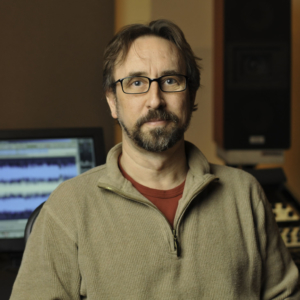
If mix engineers send you stems, what are the common problems with them?
I discourage clients from sending stems, because then I’m mixing their record. But when I get them, I haven’t had trouble. My problem is that I don’t have all of the plug-ins that [mix engineers] use.
What big changes have seen in the field in the past year or so?
Everybody is starting to see that you have to do things differently for the streaming world than for CDs or vinyl. At first, people would simply send the CD mixes. I had a case where a band wanted something mastered loud and I told them it would be too hot for Spotify and so forth. So I did it and a few days after the release, I got a panicked call from the producer because it sounded distorted on Spotify.
What are the best ways to find new clients?
Ninety percent of my clients come to me by word-of-mouth. The best way to get new business is to do every project as best you can so that your clients are happy and will pass along your name.
What are untapped sources of income for mastering engineers?
Two or three times I’ve done mastering for film work. I master different elements such as fixing the vocals or making it solid so it doesn’t move all around. I also tell kids not to get locked into one thing. You may have to do live sound or sound for a TV show.
Are present-day artists more technically savvy or less? Moreover, is it important that they be up on tech?
A huge producer said to me once––and I agree––that most of the people who are technically savvy are usually not the best artists. The best ones often can’t figure out how to use Facebook. The most important thing in any art form is that you’re able to make the art. It’s still all about the song.
Have online mastering tools improved to the point that they represent a challenge to mastering engineers?
That’s more a case of being in the eye of the beholder. In short, I don’t trust unsupervised algorithms.
When you begin to work on a track, is your first instinct about it usually correct?
It usually is. When I’ve gone back and second- guessed [some earlier work], I’ve always found that my first pass was best because I was totally in the moment. First instincts are incredibly important.
Do you master for vinyl? If so, what are the unique challenges?
We don’t have a lacquer cutter here, so when we prep our master, yes, we have to do different stuff because there are things that will be different in the physical world than in the digital. The volume doesn’t need to be crushed, because it’ll never be in a playlist up against another band. You don’t want or have to limit it nearly as much. It’s important to have some of those dynamics.
How do you help clients communicate what they want from you?
Now that most of the records I work on are self-released or indie, part of what I do is master, but also educate clients.
What’s the best path for those who aspire to become mastering engineers? Is a formal education preferred over a practical one?
A formal education doesn’t matter anymore. I learned completely on my own. It doesn’t hurt to have a basic level of understanding, but it’s important to know that when you come out of those schools, you’re really still at zero. You may have to build your own [studio] and do it from there. You have to pile firewood before you can build a big fire.
Has the field of mastering improved in terms of sound in recent years or is there still pressure for music to be loud?
It seemed like it peaked about a year ago. But with things like Spotify, you have to do it a little lower. Now about 25 percent of my clients ask me to turn it down a bit and put back some of the dynamics––more in the indie world, perhaps because of vinyl.
What big changes do you foresee for mastering?
I wonder if mastering will still be a job because of things like LANDR. As things move more toward the streaming world, we’ll be able to utilize the higher sample rates and bit depths for better quality. •
Andrew Mendelson
Company: Georgetown Masters
Clientele: The Rolling Stones, Eric Church, Willie Nelson
Contact: georgetownmasters.com
Andrew Mendelson studied music at Ithaca College and began his foray into mastering when he landed an internship with indie audiophile label Telarc, which specializes in classical and jazz records. There he learned to listen for audio artifacts and to be mindful of changes caused
by varying humidity levels in concert halls where recordings were made. He spent some time at Sony Music Studios, New York, returned
to Telarc and in 2002 was invited to work at Georgetown Masters in Nashville. In 2004 he bought the studio and now masters the majority of Billboard top country singles and records.
How has the lockdown affected your business?
For a while, I came in by myself and had my staff take systems home. It was inefficient, but we were able to keep moving. Now we’re back, in separate rooms and we’ve always worked staggered shifts. There are rarely more than three people here at any given time.
Are the changes initiated by the lockdown here to stay?
Those things were already in place; some artists already had home studios. Sometimes they record demos at home and those became the basis for the master. But that depends on the style of music. There may not be more of it, but certainly there won’t be any less.

If mix engineers send you stems, what are the common problems with them?
I strongly discourage mastering from stems unless there’s a specific reason to do so. Often they won’t sum back the same as if you’d printed a two-channel mix. It also gives you a reason to not finish mixing. The mix isn’t your final vision. In my opinion, enhancing that final mix is the true essence of mastering. Also, it costs more to master from stems. One place where I commonly use them is for radio or a cappella versions of songs.
What big changes have been seen in the field in the past year or so?
People have focused on LUFS [loudness units full scale] and are now trying to game that system. In my opinion, this is often counterproductive.
What are the best ways to find new clients?
The best way to find new clients is to deliver good-sounding masters. Also, be easy to get along with. There are probably a lot of talented people out there who aren’t working because they’re difficult to get along with.
What are untapped sources of income for mastering engineers? For example, is there much money to be made with remasters?
Next week I’ll master some music for a podcast and I used to do a lot of work for concert videos. Many people are doing vinyl-cutting, archiving and restoration. We’ve also done some basic forensic work for law firms that need interview tapes cleaned up.
Are present-day artists more technically savvy or less? Is it important that they be up on tech?
More artists have their own studios and seem to be more technically savvy. But for many artists, tech isn’t their thing. If they have a stronger technical knowledge, it may help them to communicate better. If they can’t, it’s my job to figure it out.
Have online mastering tools improved to the point that they represent a challenge to mastering engineers?
So far, it hasn’t been an issue for us, businesswise. While they can be useful in certain situations, those seem to be the types of projects that people wouldn’t have been sending out to a high-end mastering studio in the first place.
When you begin to work on a track, is your first instinct about it usually correct?
My first instinct just starts me in a direction. It may lead me down other paths I want to explore. It’s often more of a journey than simply reacting to an initial impression.
Do you master for vinyl? If so, what are the unique challenges?
I don’t cut lacquers here. Often it’s only in extreme cases that I’ll do an alternate digital EQ for vinyl. Other than that, usually it’s just a matter of making sure there’s headroom on the file, dividing it into the proper side splits and QC-ing.
How do you help clients communicate what they want from you?
When I’m doing a full album or EP at once, I like to do the first few songs and send them to the client to establish the vision for the album before I do the whole thing.
What’s the best path for those who aspire to become mastering engineers? Is a formal education preferred over a practical one?
A lot of studios will only accept interns from formal education programs, for legal reasons. If you’re interested in internships, it may be a requirement. The formal route worked well for me and I’m a strong proponent of the mentorship route. There are certainly plusses and minuses to both approaches.
Has the field of mastering improved in terms of sound in recent years or is there still pressure for music to be loud?
The proportion of people who are concerned about loudness has decreased. Some artists still prefer to master loud. We cater to our clients on a case-by-case basis.
What big changes do you foresee for mastering?
There will be a bigger emphasis on efficiency and quicker turnarounds. •
Joe Zook
Company: Mixed by Joe Zook
Clientele: AJR, OneRepublic, Katy Perry
Contact: joezook.net
Joe Zook broke into the business as a runner at legendary audio abode, Conway Recording Studios. For many years, Joe has been an established music mixer and producer.
How important is it for a mixer to be mindful of mastering issues and considerations?
It’s very important. There’s a tendency to put mastering plug-ins on in the mix stage. When you do that, you handcuff yourself and it’s harder to make it better.
Do you ever vary mixes for different mastering engineers?
Yes. Sometimes I’ll email the A&R guy and ask who’s going to master and then make different moves based on the answer.
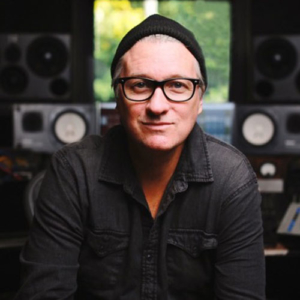
Do you ever send mastering engineers different files? For example, do you sometimes send stems?
I never send stems. I’ll sometimes send separate files that are louder––sort of a pre-mastering loudness reference that I’ll give to clients for A-B testing. That’s usually because of however the rough mix has been given to me and however people have been listening to it.
How do you deal with strong personalities in a band when he/she insists on something that is detrimental to a mix?
I deal with it diplomatically and with compassion. Nine times out of 10, their choice is completely emotional. I judge that to be an excellent place to come from. If they’re adamant, then that’s a fight I’m happy to lose because I want them to feel strongly about it.
A number of online music players employ loudness normalization. Are you mindful of this when mixing?
I’m a big fan of loudness normalization. It’s changed the game and opened things, artistically. It allows you to be competitive without having to make dynamic range choices that you would have felt pressured to conform to in the CD days.
Is automated mastering a serious challenge to mastering engineers? Do you ever use it?
It’s not even on my radar. I’ve played around with them. But I put in so much time to fix the master that there isn’t much point to automation. It’s getting better, though. •

